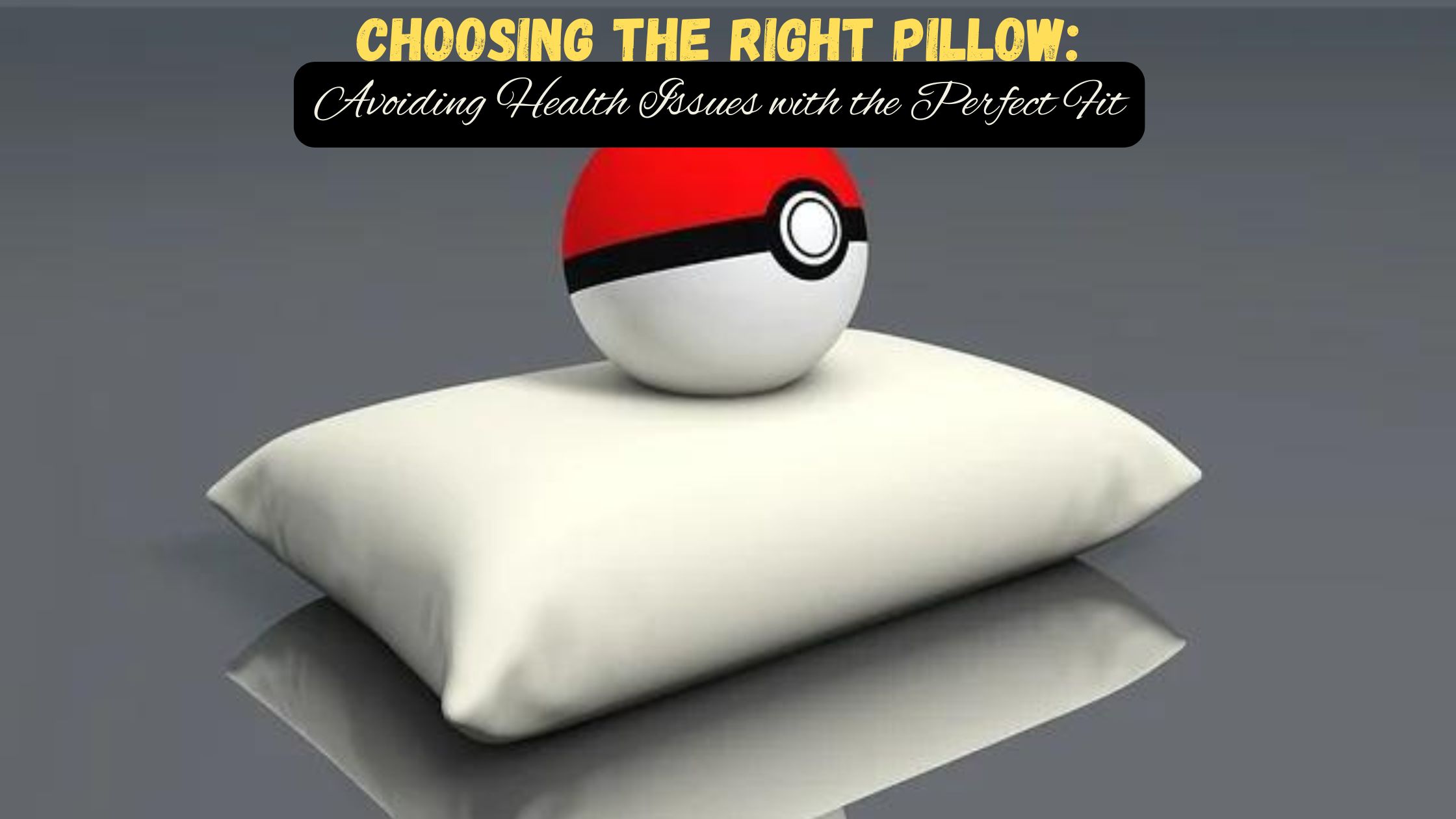Introduction:-
Choosing the Right Pillow: Avoiding Health Issues with the Perfect Fit

Achieving a restful night’s sleep is crucial for maintaining overall well-being. One vital factor that significantly impacts the quality of sleep is the pillow that cradles your head. The right pillow can serve as a preventive measure against health issues such as neck pain, headaches, and poor posture. Conversely, an unsuitable pillow can aggravate these problems. Therefore, selecting the ideal pillow is paramount to waking up refreshed and pain-free.
What type of right pillow is best for neck pain?
Understanding Pillow Types
For those who experience neck pain, finding the right pillow can be critical in achieving a restful night’s sleep. The ideal pillow should offer proper support and maintain the natural curvature of the neck, helping to keep the spine aligned throughout the night. Let’s delve into the types of pillows that are most effective in managing neck pain.
1. Memory Foam Pillows

Benefits:
- Ideal for individuals suffering from neck pain.
- Designed to conform to the shape of the head and neck, providing customized support.
- Helps maintain spinal alignment, reducing pressure points and preventing unnatural bending of the neck during sleep.
Best For:
- Back and side sleepers.
- Individuals seeking consistent support and pressure relief.
2. Cervical Pillows (Contour Pillows)
Benefits:
- Specially shaped to support the neck and promote proper spine alignment.
- Often feature a raised edge and a lower center, cradling the head while supporting the neck’s natural curve.
- Effective in reducing neck pain, particularly for back sleepers.
Best For:
- Individuals with chronic neck pain.
- Back and side sleepers who require enhanced neck support.
3. Water Pillows:
Benefits:
- Adjustable support: Add or remove water to customize the firmness level.
- Dynamic support: The water base adapts to your movements, providing consistent support for your neck and head.
Best For:
- People who prefer adjustable firmness.
- Sleepers who need adaptable support for changing sleep positions.
4. Latex Pillows:
Benefits:
- Firm support and durability: Latex pillows offer consistent support to keep your neck in a neutral position.
- Hypoallergenic properties: Natural latex is hypoallergenic, making these pillows a great choice for allergy sufferers.
Best For:
- Side sleepers who need firm support.
- Those looking for a long-lasting, hypoallergenic option.
5. Buckwheat Pillows
Benefits:
- Filled with buckwheat hulls, providing firm, moldable support that conforms to the shape of the head and neck.
- Stable support can help alleviate neck pain.
- Adjustable fill allows customization of pillow height and firmness.
Ideal For:
- Individuals who prefer natural, eco-friendly materials.
- Those who need customizable support.
6. Gel-Infused Pillows
Benefits:
- Made with memory foam and infused with gel, offering contouring support with added cooling properties.
- Helps keep the neck aligned while preventing overheating, beneficial for those with neck pain due to overheating during sleep.
Ideal For:
- Sleepers who experience overheating during the night.
- Individuals seeking memory foam support with cooling features.
Selecting the best pillow for neck pain depends on individual needs, sleep position, and personal comfort preferences. Memory foam, cervical, and latex pillows are often recommended for their supportive properties. When making a choice, consider factors such as firmness, contour, and adjustability to find the perfect pillow that relieves neck pain and promotes restful sleep.
Matching Your Pillow to Your Sleep Position
Your sleep position plays a significant role in determining the type of pillow you need:
- Back Sleepers: A medium-thickness pillow that supports the natural curve of your neck is ideal. Memory foam or contoured pillows are often good choices, as they provide support without pushing your head too far forward.
- Side Sleepers: A firm, thick pillow is best to keep your neck aligned with your spine. Look for pillows that are thick enough to fill the space between your ear and shoulder, like a latex or orthopedic pillow.
- Stomach Sleepers: A thin, soft pillow or no pillow at all is recommended to prevent strain on your neck and back. A down pillow might be a suitable choice, as it allows your head to sink in slightly, reducing strain.
Considerations for Special Needs
Certain health conditions may require specific pillow types:
- Neck Pain: If you suffer from neck pain, a memory foam or cervical pillow that cradles the neck and supports its natural curve is crucial.
- Allergies: Hypoallergenic pillows made from materials like latex or buckwheat are great for those with allergies. These materials are naturally resistant to dust mites and mold.
- Snoring or Sleep Apnea: An orthopedic pillow that elevates the head slightly can help open airways and reduce snoring or sleep apnea symptoms.
Regular Replacement and Maintenance
Even the best pillow needs to be replaced periodically. Over time, pillows lose their shape and support, which can lead to discomfort and health issues. It’s recommended to replace your pillow every 1-2 years. Regularly fluffing and cleaning your pillow can also extend its life and ensure it remains supportive.
How often should you replace your pillow?
Pillows should ideally be replaced every 1 to 2 years for several reasons:
- Hygiene: Pillows accumulate dust mites, dead skin cells, and sweat over time, leading to allergies and respiratory problems.
- Support: Pillows lose their shape and support with use, causing discomfort and pain in the head and neck.
- Material: Pillow lifespan varies based on type; memory foam or latex pillows may last up to 3 years, while down or synthetic pillows require replacement every 1-2 years.
Signs indicating the need to replace your pillow include:
- Loss of Shape: Pillow doesn’t spring back or remains flat after fluffing.
- Lumps: Pillow develops lumps or uneven areas.
- Allergies: Increased allergy symptoms upon waking.
- Discomfort: Neck or shoulder pain upon waking.
Regularly washing pillow covers and using pillow protectors can extend pillow lifespan, but replacing them every couple of years ensures optimal comfort and hygiene.
Are memory foam pillows good for side sleepers?
Memory foam pillows are highly recommended for side sleepers for several reasons.

1. Support:
- Memory foam pillows contour to the shape of your head and neck, providing excellent support.
- This helps maintain proper spinal alignment, crucial for side sleepers to avoid neck and shoulder pain.
- The material adapts to pressure points, reducing strain on the neck and shoulders, common areas of discomfort for side sleepers.
2. Firmness:
- Memory foam pillows offer consistent firmness, supporting the head, neck, and spine throughout the night.
- This is particularly beneficial for side sleepers who need a pillow that can support the gap between the head and shoulders.
3. Durability:
- Memory foam pillows tend to last longer than traditional pillows, maintaining their shape and support over time, which is essential for side sleepers who need consistent support.
4. Customizability:
- Some memory foam pillows have adjustable loft options, allowing you to achieve the ideal height and firmness for your sleeping position.
Considerations:
- Memory foam pillows can retain heat, which may be uncomfortable for some. However, many modern pillows have cooling gel or breathable covers to address this issue.
- New memory foam pillows might have a slight odor, but this typically dissipates within a few days.
Overall, memory foam pillows can be an excellent choice for side sleepers due to their support, pressure relief, and ability to maintain proper alignment.
Conclusion
Finding the right pillow isn’t just about getting cozy; it’s super important for your health. Think about how you sleep, any health issues you have, and the kind of support you need. With the right pillow, you’ll sleep like a baby and wake up feeling refreshed. Trust me, your body will be all smiles every morning!
References
Here are some references you can use for an article titled “Choosing the Right Pillow: Avoiding Health Issues with the Perfect Fit”:
- Mayo Clinic: Importance of choosing the right pillow for sleep quality and health.
- Sleep Foundation: Guide to selecting a pillow based on materials, loft, firmness, and sleeping position.
- Cleveland Clinic: Health implications of using the wrong pillow and tips for choosing the best pillow for individual needs.
- Harvard Health: Connection between pillow choice and overall health, highlighting how the right pillow prevents chronic pain and improves sleep quality.
- WebMD: Practical advice on selecting a pillow based on sleeping style, body type, and specific health concerns for a good night’s sleep.
